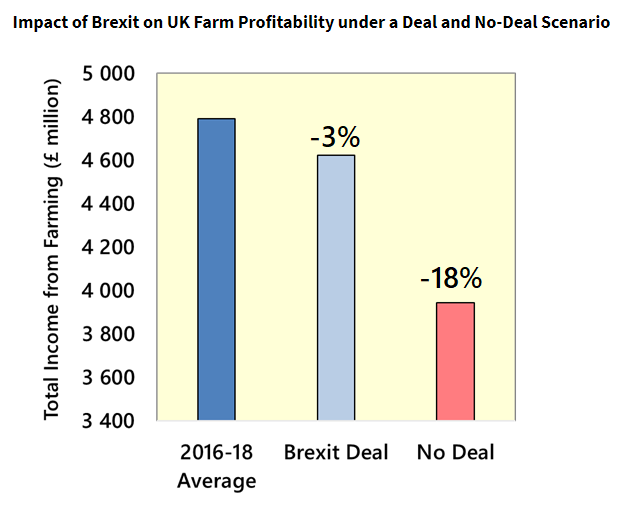UK farming will lose £850 million (€928 million) in profits in the event of a no-deal Brexit, according to research from a leading farming consultancy firm in the country.
Andersons Farm Business Consultants is predicting an 18% fall in farm profitability if the UK leaves the EU without a deal, with the projected hit “likely to surpass” the country’s industry average in some cases.
Andersons concludes that the viability of many farming businesses in the UK “will be in jeopardy”.
The research was carried out on behalf of the BBC, and assesses the impact of Brexit nine to 12 months after the country leaves the EU, looking at both a deal and no-deal scenario.
In contrast, leaving the EU with a deal would see a much smaller decline; a reduction in profitability of 3% is forecasted in that case, equating to a total loss of around £200 million (€218 million).
In terms of output values, the most notable decline was predicted in the sheepmeat sector, which is expected to be hit with a 31% fall in profits, while outputs for cereals, milk and beef are also predicted to fall.
On the other hand, increases are predicted for horticulture, poultry and pigs – provided there is enough labour available for undertaking operations.
Costs
Some input costs for UK farmers are expected to fall, due to lower tariffs on imports. These costs include animal feed, fertiliser and plant protection products.
However, other inputs, such as veterinary costs, are predicted to rise, due in part to the increased demand for vets to assist in border inspection operations for products entering the country.
Methodology
Andersons used a ‘total income from farming’ (TIFF) figure to determine the impact of Brexit, saying that this figure provides a simple measure of the profits for “UK Agriculture PLC”.
The researchers also used a three-year average figure, from 2016 to 2018 inclusive, to account for yearly variations that might arise from weather conditions and exchange rates.
The researchers stress, though, that the figures are based on the assumption that government supports for farming are kept at their current levels.
‘A stark reminder’
Jonnie Hall, director of policy with the National Farmers’ Union of Scotland (NFUS), said that the report “is a stark reminder that, while governments and the food supply chain can put in place measures to mitigate the worst outcomes from a no-deal, the risks to primary producers are very real”.
“NFUS maintains its view, shared with other UK farming unions, that avoiding a no-deal outcome and any short-term economic or even social turmoil must be the political priority,” Hall added.

